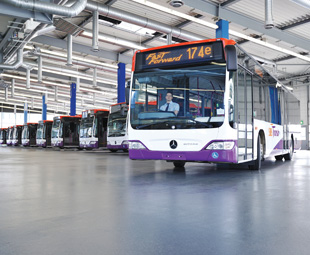Citaro a success in Singapore

… and is the British bus manufacturing industry bouncing back? FRANK BEETON comments on developments in the global bus sector
SBS Transit, Singapore’s major city bus operator, has placed an order for a further 450 two-door 12-metre Euro-4 Mercedes-Benz Citaro low floor city buses. These buses, to be built at EvoBus in Mannheim, Germany, will join 300 similar vehicles that were ordered in April 2011, the last of which were recently delivered. The new batch will feature BlueTec diesel technology and passenger area closed-circuit camera monitoring, and are scheduled for delivery from late 2012 to the end of 2015.
Each of the Singapore buses is equipped with 13 priority seats for elderly or handicapped passengers, a wheelchair ramp, and air-conditioning. Daimler Buses says this is the biggest Asian order ever for Citaro buses, and, after chalking up 33 000 unit sales over the past 13 years, claims that this model has become the most successful city bus of all time. SBS operates a total fleet of around 3 000 buses on 250 feeder, express and premium routes across the city state.
BRITS BOUNCING BACK
South African operators have a long historic association with British bus manufacturers, dating back to the very early days of the 20th Century. That industry is now, however, only a shadow of the world leader it was in the 1960s, and in 2004 suffered one of its many failure and realignment episodes.
The main events in that upheaval were the collapse of the Mayflower Corporation and the liquidation of the associated Henlys Group Plc. These two organisations owned or part-owned a substantial number of manufacturing operations, with deep roots in the passenger transport business on both sides of the Atlantic. Through its 70 percent shareholding in Transbus International, Mayflower controlled such iconic British names as chassis manufacturer Dennis and coachbuilders Plaxton and Alexander Holdings.
During the subsequent reorganisation, the bulk of the Transbus operation was sold off to Scottish interests, and re-emerged as Alexander Dennis Limited (ADL), while Plaxton was bought by its management. This served to ensure that the historic names of Plaxton, Dennis and Alexander did not disappear as a result of the Mayflower/Henlys collapse. The Dennis history as a vehicle manufacturer dates back to 1895, when Dennis Brothers was established in Guildford. The company supplied many buses to South African operators between the First and Second World Wars, before making a small incursion back into the local market during the Atlantis Diesel Engine era. Alexander had its bus and coach bodying roots in Walter Alexander of Falkirk, Scotland, which was founded in 1924. ADL’s subsequent corporate restructuring necessitated closure of its dispersed manufacturing locations in Wigan, Anston and Larbert, and most activities were then concentrated around the traditional Alexander headquarter site in Falkirk, although chassis manufacture still takes place at the company’s traditional “home” in Guildford, Surrey.
During June 2007, it was announced that ADL had acquired coach specialist Plaxton Holdings Limited of Scarborough, North Yorkshire, to create Britain’s biggest bus and coach manufacturing organisation. The combined enterprise brought together a staff of some 1 900 people, and consolidated a comprehensive product line-up, including mini, midi, and single-deck buses, two- and three-axled double-deckers, and small, medium and heavyweight coaches. In addition to providing products completely built by in-house resources, it also continued to cooperate with outside chassis suppliers, and has more recently become substantially involved with hybrid driveline passenger vehicles.
Since reorganisation, ADL has established a sales, support and assembly operation in Hong Kong to underpin its Asian and Australasian interests, which include a large double-deck fleet operating in Hong Kong, and a manufacturing partnership with NZ Bus in Auckland, New Zealand. The company achieved a turnover of £360 million in 2011, returning growth of 110 percent over the preceding four years.
During the current year, ADL has taken two important new steps to broaden its international footprint. Firstly, in May, it entered into a long-term joint venture with independent North American heavy-duty bus manufacturer New Flyer Industries Inc to develop a medium duty low-floor transit bus for the United States and Canadian markets. This step reflects identified sales opportunities among both public transit and private shuttle operators for buses of this type with a 10-year design life. Sales are expected to total 1 000 units per annum. In terms of the agreement, ADL will bear responsibility for engineering, testing and prototype development, while New Flyer will handle manufacturing, marketing, sales and aftermarket support for this product. Prototypes will be built during the current year, and market entry is forecast for early 2013.
The second significant step was the recent acquisition of Custom Coaches of Sydney, Australia. This family-owned company, which built its first bus in 1955, currently designs and manufactures lightweight stainless steel bodies for low floor, city, midi and school buses at factories located in Sydney and Adelaide. Custom Coaches reportedly enjoys around 24 percent of the Australian bus market, servicing a broad spectrum of state governments, corporate clients and family-run operations.
This resurgence in the fortunes of ADL stands out as a rare example of an independent British automotive enterprise achieving notable success in the modern business world. While other iconic motoring names have lived on, most of them have been acquired and are now controlled by foreign interests, with, in some cases, only a manufacturing presence retained in the United Kingdom, while others have relocated completely offshore. With a corporate history that extends back for more than a century, it is therefore appropriate that ADL still operates from its traditional home bases.
Published by
Focus on Transport
focusmagsa



